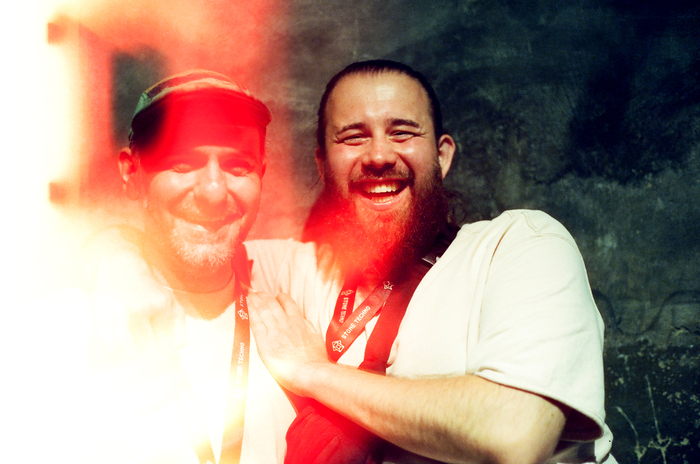The Third Room è un event series, studio di registrazione e label di Essen, cittadina nel bacino della Ruhr, motore creativo dietro lo Stone Techno Festival. Il founder Ahmet Sisman e core member Almedin Alibegovic (aka VNNN.), entrambi resident DJ, ci hanno introdotto nel mondo musicale di The Third Room, caratterizzato da sfondi post-industriali, riferimenti alla mineralogia e omaggi alla legacy techno tedesca.
Non solo Berghain, Kit Kat e Tresor. Non solo Berlino. La Germania è un territorio florido per la cultura underground e la musica techno. Una regione metropolitana in particolare, fino agli anni ’80 cuore industriale europeo per l’estrazione del carbone e che conta circa 5,3 milioni di abitanti, spicca oggi come capitale fiorente del clubbing: la Ruhr. Tra i collettivi più noti e apprezzati attivi nella zona emerge The Third Room.
Essen-based, “La Terza Stanza” organizza festival e party in venue di rilevante portata storica e sociale. Impossibile non associare il collettivo alla Zeche Zollverein, vecchia miniera di carbone di Essen, oggi patrimonio UNESCO, “La Tour Eiffel del bacino della Ruhr” per i romantici. Ma The Third Room si distingue anche come etichetta. Ahmet Sisman e Almedin Alibegovic (aka VNNN.), fondatori e resident dj, ci hanno portato nell’universo del collettivo, raccontandoci aneddoti riguardo il mondo del clubbing tedesco, le sfide da loro incontrate, e il loro caratteristico Stone Techno Festival.
Ciao Ahmet, ciao Almedin. Benvenuti su Parkett. Come mai il nome The Third Room?
Ahmet: Si parte subito con una risposta molto, molto lunga (ride). In realtà “The Third Space” è una teoria del sociologo Homi K. Bhabha. Ho studiato sociologia e mentre scrivevo la mia tesi magistrale mi sono imbattuto nei suoi studi.
In particolare, mi ha colpito la sua teoria del third space, in cui Bhabha ha analizzato e studiato i comportamenti dei migranti indiani a Londra e come procede la loro vita lì da gente proveniente a sua volta da un’antica colonia inglese. Creano “terzi spazi“, third spaces, dove né la cultura del Paese di arrivo né quella di origine predominano, ma possono coesistere in armonia, dando vita a dei cosiddetti luoghi ibridi. È un fenomeno globale, che riguarda molti flussi migratori. Basti pensare anche alle comunità turche che vivono in Germania.
Tale concetto si applica anche alla musica. Diversi stili musicali posso incontrarsi, fondersi. E non solo, si potrebbero fare tantissimi esempi di come questa teoria si presenta in diversi contesti. L’ex miniera del carbone dello Zollverein (Zeche Zollverein), patrimonio UNESCO, location dello Stone Techno Festival, con il suo paesaggio post-industriale si adatta perfettamente alle melodie techno. Così, si genera un altro terzo spazio.
The Third Room, dunque, rappresenta un luogo ibrido in cui diverse influenze si intrecciano e si completano a vicenda, in maniera sinergica, senza che un elemento predomini o soffochi l’altro.

Ahmet, hai già accennato al profondo legame tra The Third Room e i luoghi post-industriali, è un po’ un marchio di fabbrica del collettivo. Potresti approfondire ulteriormente questo aspetto?
Ahmet: Third Room nasce nel 2017 come party format mensile nello Studio Club, storico club di Essen. Nel frattempo mi occupavo di organizzare eventi alla Zeche Zollverein, un luogo che ho sempre considerato unico nel suo genere. Da lì ho cominciato a fantasticare sulla possibilità di organizzare un grande festival in quella venue.
Vivere nel bacino della Ruhr ha i suoi vantaggi e svantaggi. In ogni città della regione, da Duisburg a Dortmund, passando per Bochum e Essen, esistono cornici industriali storiche, tra cui Zollverein spicca per la sua unicità, essendo stata la più grande miniera d’Europa e ora patrimonio dell’UNESCO.
Non è un caso che Henry Ford e General Motors, così come la techno, vengano da Detroit. Questo legame storico e sociale è un punto di svolta, specialmente considerando l’introduzione del principio del nastro trasportatore e l’automazione. Nella città del Michigan, dove la crisi industriale ha portato alla chiusura delle fabbriche e a un’alta disoccupazione, la techno è nata come una nuova espressione musicale, legata strettamente al concetto di tecnologia.
Ci vedo un parallelismo con la situazione in questo territorio, dove a fine anni ’80 tantissime industrie hanno chiuso i battenti. L’unica differenza è che qui manca una vera e propria scena consolidata, come magari c’è anche in città italiane come Milano, Torino. Noi ce l’abbiamo fatta davvero nel 2023, ci è voluto un po’ di tempo.
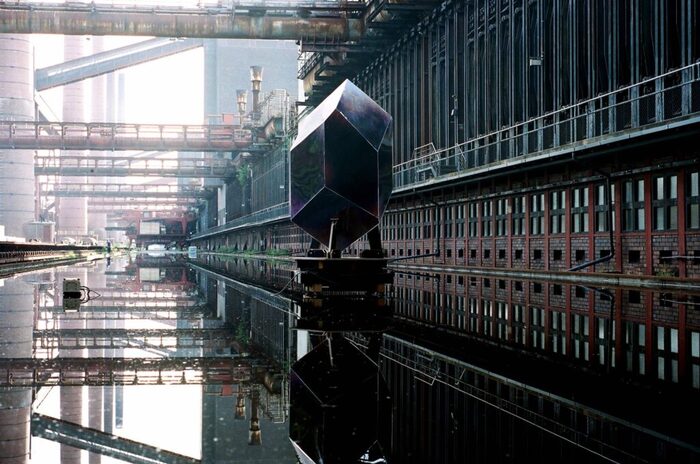
Trovo incredibile come siate riusciti a risollevarvi dopo la pandemia. Qual è stato il vostro segreto? Cosa vi distingue da altri collettivi e label?
Ahmet: Non dormivo, ho passato gran parte di quel periodo chiuso in camera. Avevamo un evento in programma alla Zeche, prontamente cancellato a seguito delle prime restrizioni del governo. Poco dopo mi ha contattato Achim, un geologo del Ruhrmuseum (museo regionale del bacino della Ruhr, con sede alla Zeche Zollverein). Insieme, abbiamo ideato il concept dello Stone Techno Festival.
Achim mi ha introdotto ad una sua sound library ricca di sample di minerali e mi ha proposto di lavorare insieme. Da questa collaborazione, nel 2021 nasce la prima Stone Techno Series, articolata in quattro EP. Nel 2022, invece, dall’incontro con il musicista Matthew Herbert viene rilasciata la seconda Stone Techno Series, composta da sedici tracce prodotte utilizzando i sample del compositore inglese.
In più, durante il COVID, abbiamo anche registrato un live streaming al Museo dello Schaudepot che ha avuto tantissimo successo, ci ha motivati tantissimo. E ci ha fatto considerare l’idea di organizzare un festival.
Durante la pandemia abbiamo avuto il tempo per dedicarci a progetti che in precedenza sarebbero stati impossibili. È stato un periodo cruciale per il futuro di The Third Room – ci ha dato l’opportunità di ridefinirci, capire in che direzione andare, dove posizionarci.
A seguito della pandemia la percezione della techno è un po’ cambiata. Penso a come sia diventata mainstream sui social, in particolare TikTok. Pensate che questa, permettetemelo, “commercializzazione” di questo genere musicale abbia contribuito anche al vostro successo?
Almedin: Abbiamo lavorato duramente per costruire il nostro marchio e condividere la nostra visione attraverso i social media. Il successo è arrivato in modo significativo dopo la pandemia. Nel 2022 avevamo 10k follower, e ora siamo arrivati a 58k, un notevole aumento in soli 18 mesi. L’ascesa social è stata sicuramente influenzata dallo Stone Techno Festival, dai video virali, oltre che dal nostro concept visuale.
Tuttavia, credo che il nostro successo sia principalmente il risultato del nostro impegno costante e della coerenza nel gestire i social media. Postiamo regolarmente, anche due volte al giorno. Cerchiamo sempre di mantenere un profilo underground e discreto, ma partecipiamo al gioco dei social media secondo le nostre regole. Penso che il nostro approccio sia apprezzato dal pubblico e che funzioni bene su Instagram, come è evidente. Quindi non so quanto effettivamente il “techno trend” abbia contribuito al nostro successo mediatico.
Il festival Stone Techno è ormai molto conosciuto a livello internazionale. Quali sono le maggiori sfide che incontrate durante l’organizzazione?
Almedin: In quel caso, il 90% del nostro lavoro consiste nel correre dietro ad artisti, manager, per finalizzare i contratti. Bisogna essere ben preparati e riuscire a pianificare a lungo termine. Ma dipende molto da chi collabora con te. Ma Ahmet sicuramente saprà dirti di più di me.
Ahmet: Discussioni, pianificazioni intensive e infinite e-mail sono all’ordine del giorno. Si tratta di inseguire costantemente le persone, chiedendo loro di fare ciò che è necessario. È come gestire una nave: devi essere al timone fino a quando tutto a bordo funziona correttamente e non puoi virare rapidamente a destra o a sinistra.
Ora ho molta empatia per gli organizzatori dei festival, anche quando a volte commettono grossi errori. Il pubblico spesso si lamenta, ma non si rendono conto di quanto lavoro ci sia dietro!
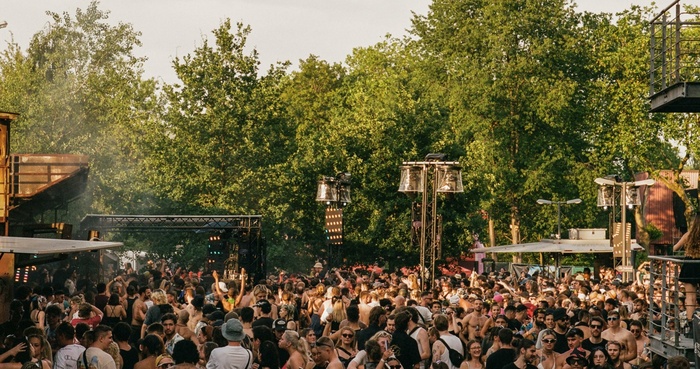
Quando scegliete la line up, ci sono alcuni aspetti a cui prestate particolarmente attenzione?
Almedin: Sì, la diversità è per noi un aspetto cruciale, puntiamo decisamente a un equilibrio fifty-fifty. Ci impegniamo molto su questo fronte. Nel 2022 siamo riusciti a ingaggiare più artiste donne che uomini, un traguardo che considero significativo e abbastanza unico. Tuttavia, non è semplice, perché oltre alla musica, dobbiamo considerare il profilo complessivo dell’artista, la sua presenza online, e valutare se si adatta bene al nostro concept. Non vogliamo collaborare con degli stronzi (ride).
Ci sono artisti che abbiamo invitato più volte, perché sappiamo cosa aspettarci da loro. Penso ad Hector Oaks, Ellen Alien, Dax J, Patrick Mason, con cui abbiamo costruito delle belle amicizie in questi anni. È meraviglioso creare legami attraverso la musica. (QUI line up completa Stone Techno 2024 – QUI acquisto ticket)
In più, per noi è fondamentale che gli artisti, così come i partecipanti e lo staff si sentano a proprio agio. Ho origini bosniache, Ahmet turche, l’accoglienza per noi è un valore fondamentale. La prima cosa che mia mamma mi chiede quando vado a trovarla è «hai mangiato?». Ma sicuramente anche da te in Italia è così, no?
Assolutamente! Oltretutto, vendete anche ticket a prezzo ridotto per gli studenti, è un’iniziativa molto inclusiva.
Ahmet: La techno è parte della nostra cultura e ci piace che i giovani possano avvicinarsi a questa realtà. Siamo felici di renderla accessibile a un pubblico più ampio.
Mi chiedevo, vi piacerebbe ritornare nei club?
Ahmet: Da Gennaio (l’intervista ha avuto luogo nel 2023) cominceremo un club tour con cinque, sei showcase in giro per l’Europa. Per ora in programma ci sono delle date al Gewölbe di Colonia, alla Galerie Kurzweile di Darmstadt, al Fuse di Bruxelles, al Basement di Madrid, alla Vault Session di Amsterdam e alcuni eventi a Berlino. Ad inizio anno abbiamo suonato anche al Tresor West di Dortmund e all’AMP di Münster.
Per il resto continuiamo con il nostro Stone Techno Festival e il Third Room Festival alla Heinrichshütte (ex fonderia) di Hattingen in agosto (QUI i biglietti).
Abbiamo parlato molto dei vostri eventi, mi piacerebbe scoprire qualcosa in più riguardo la label The Third Room. Anche qui talvolta nei suoni, ma anche nei visual – scusate, sarò ripetitiva – noto un’influenza post-industriale, o mi sbaglio?
Ahmet: Devo dissentire. Abbiamo mantenuto un approccio aperto a più generi nelle nostre release. Almedin può dirti di più, lui è l’A&R dell’etichetta.
Almedin: Capisco a cosa ti riferisci, se penso alla serie con i sample dei minerali sono d’accordo. Per il resto concordo con Ahmet, siamo molto aperti a diversi stili. L’etichetta non è il nostro motore principale per guadagnare denaro, quindi non vogliamo rilasciare tracce funzionali per fare soldi. Manteniamo un approccio molto personale, è fondamentale per noi. Credo sia un nostro tratto distintivo.
Abbiamo lavorato e lavoriamo ad una serie di release molto variegate, che include molti artisti, amici, con cui abbiamo collaborato quest’anno. Così, abbiamo raccolto 16 tracce e creato quattro dischi con un tema specifico per ciascuno. Per esempio, il primo è molto dubby e groovy, il secondo è più gnarly, il terzo più sperimentale. I pre-order dei primi tre EP erano sold out dopo pochi giorni e la release ufficiale della prima e seconda series sono ormai completamente sold out. È possibile preordinare la T3R VA Series 04 su Bandcamp (Pre-order).
È una questione di cuore e ciò deve riflettersi anche nella musica. L’etichetta è un mezzo per dimostrare chi siamo. E siamo decisamente due sound nerds. Io suono musica molto ipnotica, ma amo anche l’ambient e il broken beat. Ho ascoltato drum and bass per anni, quindi sono aperto a tutto ciò che è stimolante e interessante da pubblicare.
Ultima domanda. Cosa c’è nel futuro di The Third Room?
Ahmet: Vogliamo conquistare il mondo! (ride) – Scherzo.
Almedin: Sicuramente voglio curare di più la label, trovare nuovi concept e temi da sviluppare per le prossime release. Promuovere artisti locali, questo è un mio obiettivo. Ecco perché conduco su Instagram un format mensile che si chiama “Tracks of the Month“, in cui producer mi mandano la loro musica ed io la commento nei miei live streaming. Ci sono molti talenti là fuori che forse non ricevono sempre l’attenzione che meritano, e che bisognerebbe pubblicare su una buona etichetta. Voglio incoraggiarli e sostenerli, se producono qualcosa di valido.
Ahmet: Per quanto riguarda gli eventi, non puntiamo ad espanderci troppo. Lo Stone Techno Festival ha ottenuto un’importante notorietà e riconoscimento internazionali. Non ci prefiggiamo l’obiettivo di espanderlo ulteriormente, piuttosto, preferiamo mantenere il livello di successo raggiunto e continuare a svilupparlo fedelmente alla sua identità originale. Non vogliamo “commercializzarlo”.
Sia nella musica che nel booking, è fondamentale che ci piacciano le cose che facciamo. Altrimenti non ne vale la pena.
Ahmet, Almedin, grazie mille. Un’intervista ricca di spunti interessanti. Conoscervi è stato un piacere. Ci vediamo allo Stone Techno Festival!
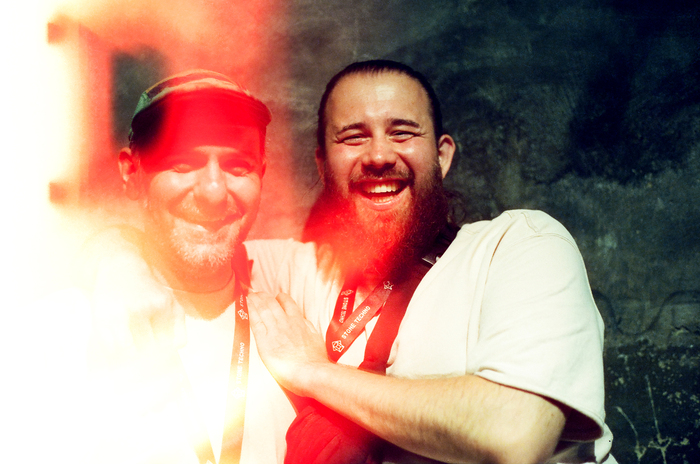
ENGLISH VERSION
Coal Mines at 140 BPM: Interview with The Third Room Label and Event Series
The Third Room, an event series, label and mastering studio based in Essen – a city in the Ruhr area – is the creative force behind the Stone Techno Festival. The founder Ahmet Sisman and the core member Almedin Alibegovic (aka VNNN.), both resident DJs, have introduced us to the musical world of The Third Room, marked by post-industrial influences, references to mineralogy, and tributes to the legacy of German techno.
Not just Berghain, Kit Kat, and Tresor. Not only Berlin. Germany is a fertile ground for underground culture and techno music. One metropolitan region, in particular, stands out as a thriving hub of clubbing today: the Ruhr Area. Known as the industrial heart of Europe for coal mining until the 1980s and home to about 5.3 million people, it now shines in the clubbing scene. Among the most renowned and appreciated collectives active in this area is The Third Room.
Based in Essen, The Third Room organizes festivals and parties in venues of historical and social significance. The collective is inextricably linked to the Zeche Zollverein, an old coal mine in Essen now an UNESCO World Heritage site, dubbed “The Eiffel Tower of the Ruhr area” by romantics. But The Third Room also stands out as a record label. Founder Ahmet Sisman and core member Almedin Alibegovic (aka VNNN.) took us into the universe of the collective, sharing anecdotes about the German clubbing world, the challenges they’ve faced, and their unique Stone Techno Festival.
Hi Ahmet, hi Almedin. Welcome to Parkett. Why the name The Third Room?
Ahmet: Let me start with a very, very long answer (laughs). Actually, “The Third Space” is a theory by sociologist Homi K. Bhabha. I studied sociology, and while writing my master’s thesis, I came across his studies.
Bhabha’s theory of the third space particularly struck me. He analyzed and studied the behaviors of Indian migrants in London and how their lives unfold there, coming from a former British colony. They create “third spaces,” where neither the culture of the arrival country nor that of origin predominates, but can coexist in harmony, giving rise to so-called hybrid places, liminal or in-between spaces. It’s a global phenomenon, relevant to many migratory flows. Also, take into account the Turkish communities residing in Germany.
This concept also applies to music. Different musical styles can meet and merge. Plus, there are plenty of examples showing how this theory plays out in various contexts. The former Zollverein coal mine (Zeche Zollverein), an UNESCO World Heritage site and the location of the Stone Techno Festival, with its post-industrial landscape, fits perfectly with techno melodies. Thus, another third space is generated.
The Third Room, therefore, represents a hybrid place where different influences intertwine and complement each other harmoniously, without one element dominating or stifling the other.
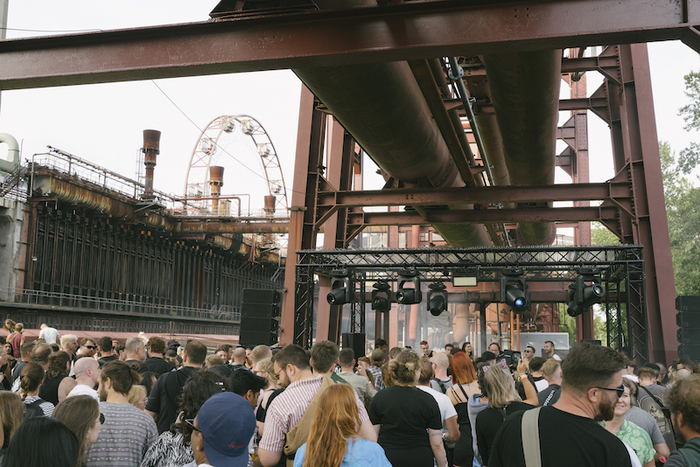
Ahmet, you’ve already mentioned the deep connection between The Third Room and post-industrial sites, which seems to be somewhat of a signature trait of the collective. Could you elaborate further on this aspect?
Ahmet: The Third Room was born in 2017 as a monthly party format at Studio Club, a historic club in Essen. At that time, I was also involved in organizing events at Zeche Zollverein, a place I’ve always considered unique. This sparked the idea of organizing a big festival at that venue.
Living in the Ruhr Area, which includes cities from Duisburg to Dortmund, through Bochum and Essen, presents both advantages and challenges. Each city has its historic industrial frameworks, and Zeche Zollverein is a standout, being the largest coal mine in Europe and now an UNESCO World Heritage site.
It’s no coincidence that Henry Ford and General Motors, as well as techno, come from Detroit. This historical and social link is significant, especially considering the innovations like the conveyor belt principle and automation. There, the industrial crisis led to factory closures and high unemployment, giving rise to techno as a new musical expression deeply tied to technology.
Similarly, in the Ruhr Area, many industries shut down at the end of the ’80s. The main difference here is the lack of an established scene, unlike Italian cities like Milan or Turin. We really made it in 2023, it took us a bit of time.

It’s incredible how you managed to bounce back after the pandemic. What’s your secret? What distinguished you from other collectives and labels?
Ahmet: I barely slept, spending most of that period locked in my room. We had an event planned at Zeche, which we had to cancel abruptly due to the government’s initial restrictions. Shortly after, I was contacted by Achim, a geologist at the Ruhrmuseum – regional museum of the Ruhr region located at Zeche Zollverein. Together, we conceived the idea for the Stone Techno Festival.
He introduced me to a sound library composed of mineral samples and proposed that we work together. Consequently, in 2021, we released the first Stone Techno Series, which consisted of four EPs. In 2022, we collaborated with the musician Matthew Herbert – utilizing his samples as well – and launched the second Stone Techno Series, featuring 16 tracks. We also recorded a live streaming at the Schaudepot Museum, which turned out to be very successful and highly motivating. And it made us consider the idea of organizing a festival.
During the pandemic, we had time to dedicate ourselves to projects that previously would have been impossible. It was a crucial period for the future of The Third Room – it gave us the opportunity to redefine ourselves, understand which direction to go, where to position ourselves.
Following the pandemic, the perception of techno has changed a bit. I think about how it has become mainstream on social media, particularly TikTok. Do you think that this, let me say, “commercialization” of this musical genre has also contributed to your success?
Almedin: We worked hard to build our brand and share our vision through social media. Success came significantly after the pandemic. In 2022 we had 10k followers, and now we’ve reached 58k, a considerable increase in just 18 months. The social rise was definitely influenced by the Stone Techno Festival, viral videos, and our visual concept.
However, I believe that our success is primarily the result of our constant commitment and consistency in managing social media. We publish regularly, even twice a day. We always try to maintain an underground and discreet profile, but we participate in the social media game according to our rules. I think our approach is appreciated by the audience and works well on Instagram, as is evident. So, I don’t know how much actually the “techno trend” has contributed to our media success.
Stone Techno Festival is now well-known internationally. What are the biggest challenges you face in organizing it?
Almedin: In that case, 90% of our work consists of running after artists, managers, to finalize contracts. You have to be well prepared and able to plan in the long term. It depends a lot on who collaborates with you too. But Ahmet will surely tell you more than me.
Ahmet: Discussions, intensive planning, and endless emails are the order of the day. It’s about constantly chasing people, asking them to do what is necessary. It’s like managing a ship: you have to be at the helm until everything on board works correctly, and you can’t turn quickly to the right or left.
Now I have a lot of empathy for festival organizers, even when they sometimes make big mistakes. The public often complains, but they don’t realize how much work is behind it!

When choosing the lineup, are there certain aspects you pay particular attention to?
Almedin: Yes, diversity is crucial for us, we definitely aim for a fifty-fifty balance. We work hard on this front. In 2022 we managed to engage more female artists than men, a goal I consider significant and quite unique. However, it’s not easy, because in addition to music, we have to consider the artist’s overall profile, their online presence, and assess whether they fit well with our concept. We don’t want to collaborate with assholes (laughs).
There are artists we have invited several times because we know what to expect from them. I think of Hector Oaks, Ellen Alien, Dax J, Patrick Mason with whom we have built beautiful friendships over the years. It’s wonderful to create bonds through music. (HERE complete lineup Stone Techno 2024 – HERE ticket purchase)
Moreover, it’s important that artists, as well as participants and staff, feel at ease. I have Bosnian origins, Ahmet Turkish, hospitality, for us, is a fundamental value. The first thing my mom asks me when I visit her is, «have you already eaten?». But surely it’s the same in Italy, right?
Absolutely! Then, you also sell discounted tickets for students, it’s a very inclusive initiative.
Ahmet: Techno is part of our culture, and we like young people to approach this reality. We’re happy to make it accessible to more people.
I was wondering, would you like to return to clubs?
Ahmet: From January (the interview took place in 2023), we will start a club tour with five, six showcases around Europe. For now, dates are scheduled at Gewölbe in Cologne, Galerie Kurzweile in Darmstadt, Fuse in Brussels, Basement in Madrid, Vault Session in Amsterdam, and some events in Berlin. At the beginning of the year, we also played at Tresor West in Dortmund and AMP in Münster.
Plus, we’re continuing with our Stone Techno Festival and The Third Room Festival at the old Heinrichshütte foundry in Hattingen this August (you can grab your tickets HERE).
We’ve talked a lot about your events, I’d love to learn more about The Third Room label. Sometimes in the sounds, but also in the visuals – sorry if I’m repeating myself – I notice a post-industrial influence, am I wrong?
Ahmet: I have to disagree. We’ve kept an open approach to multiple genres in our releases. Almedin can tell you more as he’s the A&R of the label.
Almedin: I see what you mean, especially if I think about the series with the mineral samples, I agree. But for the rest, I agree with Ahmet, we’re very open to different styles. The label isn’t our main engine for making money, so we don’t want to release functional tracks just for profit. We maintain a very personal approach, it’s fundamental for us. I think it’s one of our distinguishing features.
We’ve worked and are working on a series of very varied releases, which includes many artists, friends, with whom we’ve collaborated this year. So, we’ve collected 16 tracks and created four records with a specific theme for each. For example, the first one is very dubby and groovy, the second one is more gnarly, the third more experimental. The pre-orders for the first three EPs sold out within days, and both the first and second series are now completely sold out. Pre-orders for the fourth record, T3R VA Series 04, are currently available on Bandcamp.
It’s a matter of the heart and this must also reflect in the music. The label is a means to show who we are. And we are definitely two sound nerds. I play very hypnotic music, but I also love ambient and broken beat. I’ve listened to drum and bass for years, so I’m open to anything that is stimulating and interesting to publish.
Last question. What’s in the future for The Third Room?
Ahmet: We want to conquer the world! (laughs) – Just kidding.
Almedin: Definitely, I want to take more care of the label, find new concepts and themes to develop for future releases. Promoting local artists is a goal of mine. That’s why I run a monthly format on Instagram called “Tracks of the Month“, where producers send me their music and I comment on it during my live streams. There are many talents out there who might not always get the attention they deserve, and who should be released on a good label. I want to encourage and support them, if they produce something worthwhile.
Ahmet: As for events, we’re not aiming to expand too much. The Stone Techno Festival has achieved significant international fame and recognition. We don’t plan to expand it further, rather, we prefer to maintain the level of success achieved and continue to develop it faithfully to its original identity. We don’t want to “commercialize” it.
In both music and booking, it’s fundamental that we like the things we do. Otherwise, it’s not worth it.
Ahmet, Almedin, thank you so much. This interview was full of interesting insights. It’s been a pleasure getting to know you. See you at the Stone Techno Festival!
